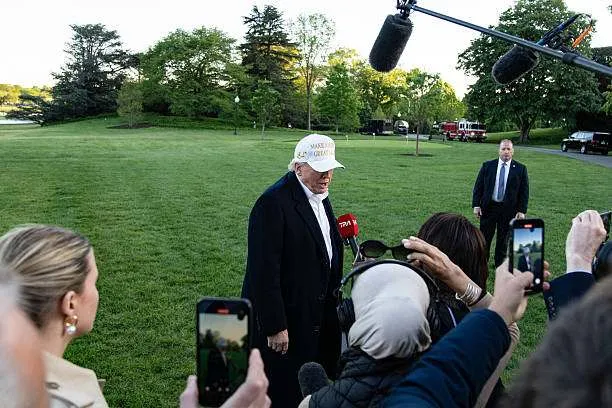Trump calls on Putin to halt missile attacks and negotiate peace
Trump urges Putin to stop missile attacks on Ukraine, while pushing for a diplomatic solution to the ongoing conflict.
 |
| President Donald J. Trump speaks to reporters upon arriving at the White House from Bedminster, New Jersey, in Washington, D.C., on April 27, 2025. Photo by Andrew Thomas/Middle East Images |
By Anna Fadiah and Hayu Andini
Donald Trump expressed mounting frustration with Russia over its ongoing attacks on Ukraine, but remained optimistic that a peace deal was still possible. In a press briefing on Sunday, Trump reiterated his criticism of Russian President Vladimir Putin’s relentless missile strikes, particularly in the wake of a deadly attack on Kyiv that killed 12 civilians. Trump’s comments reflect growing impatience in Washington as efforts to mediate a ceasefire falter.
"I was very disappointed that missiles were [launched] by Russia," Trump told reporters aboard Air Force One, as he returned to the White House. "I want [Putin] to stop shooting, sit down, and sign a deal." The remarks highlight a key shift in U.S. rhetoric as it seeks to increase diplomatic pressure on both Russia and Ukraine to reach a negotiated settlement.
These statements came a day after Trump’s meeting with Ukrainian President Volodymyr Zelenskyy in Rome. Their encounter, which took place on the sidelines of Pope Francis's funeral, was the first face-to-face discussion between the two leaders since their tense meeting in the Oval Office in February.
Trump characterized the meeting as a “beautiful” exchange, expressing admiration for Zelenskyy’s handling of the war. "I see him as calmer," Trump observed, "I think he understands the picture, and I think he wants to make a deal." This optimism contrasts with the growing frustration from the U.S. government over the lack of progress in peace talks.
Continued Russian missile strikes escalate tensions
In the past week, Russia has intensified its attacks on Ukraine, culminating in a strike on Kyiv that marked its deadliest assault of the year. The missile barrage killed 12 people and injured nearly 90 others, prompting harsh criticism from Trump. On his Truth Social platform, Trump issued a direct plea to Putin, writing: “Vladimir, STOP!” He condemned the attack as "unnecessary" and renewed his calls for Russia to halt its military offensive.
Despite the criticism, Russian Foreign Minister Sergei Lavrov dismissed calls for a ceasefire. In a pre-recorded interview on CBS’s Face the Nation aired Sunday, Lavrov insisted that Russia would not relent in its military operations. "We will continue to target the sites used by the military of Ukraine, by some mercenaries from foreign countries and by instructors whom the Europeans officially sent to help target Russian civilian sites," Lavrov stated.
Lavrov’s comments underscore Moscow’s hardline stance, suggesting that there is little incentive for Russia to back down without substantial diplomatic shifts. The continued missile strikes serve as a reminder of the military realities on the ground, where both sides remain entrenched in their positions despite international calls for peace.
Zelenskyy demands increased global pressure on Russia
Ukrainian President Zelenskyy echoed Trump’s sentiments on Sunday, calling for more robust global pressure on Russia. He noted that the ongoing missile attacks, which have continued relentlessly throughout the week, show that “more tangible pressure on Russia is needed to create more opportunities for real diplomacy.” In a post on social media platform X, Zelenskyy stated that the current level of international pressure was insufficient to bring about an end to the war.
"The situation on the frontline and the real activity of the Russian army prove that the current global pressure on Russia is insufficient to bring this war to an end," Zelenskyy wrote, further highlighting Ukraine’s frustration with the slow pace of international action.
Zelenskyy’s remarks reflect growing concerns within Ukraine about the lack of meaningful progress in peace negotiations. As the war continues to devastate the country, there is an increasing sense of urgency to find a diplomatic solution before more lives are lost.
Trump’s peace envoy and U.S. impatience with stalled talks
Amid these mounting tensions, Trump’s special envoy Steve Witkoff met with Russian officials last week in what the Kremlin described as a “constructive” meeting. However, senior U.S. administration officials have indicated that Washington is losing patience with the lack of significant progress in peace negotiations.
Secretary of State Marco Rubio, in an interview with NBC’s Meet the Press on Sunday, warned that the U.S. was prepared to walk away from the peace talks if a deal was not reached quickly. “It needs to happen soon,” Rubio stated. "We cannot continue to dedicate time and resources to this effort if it’s not going to come to fruition."
Rubio’s comments reflect a growing sense of urgency within the U.S. government, as it faces mounting pressure to demonstrate results in its diplomatic efforts to end the conflict. The administration is expected to make a critical decision about the future of its involvement in the peace process in the coming days.
A pivotal moment in U.S. foreign policy
As the war in Ukraine continues, Trump’s criticism of Russia’s missile strikes highlights a significant shift in U.S. foreign policy, where the focus has shifted toward forcing both Russia and Ukraine to the negotiating table. While Trump remains optimistic that a peace deal is still achievable, the escalating violence on the ground complicates efforts to broker a ceasefire.
Trump’s calls for Putin to “stop shooting” and negotiate are indicative of the U.S.’s growing frustration with Moscow’s intransigence. As both sides dig in, the U.S. faces a critical decision on whether to continue its diplomatic efforts or refocus its resources on other geopolitical concerns.
In the coming weeks, the direction of U.S. foreign policy regarding the Russia-Ukraine conflict will likely have far-reaching implications for international relations. The outcome of the ongoing peace talks may ultimately determine the future of Europe’s security landscape and the West’s broader geopolitical strategy.
